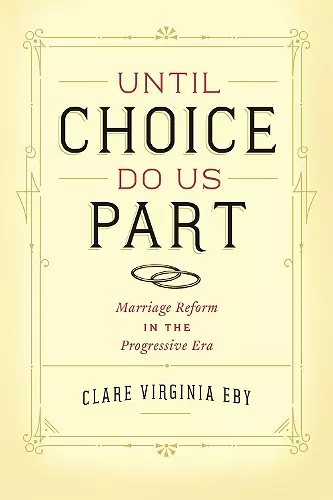Until Choice Do Us Part
Marriage Reform in the Progressive Era
Format:Paperback
Publisher:The University of Chicago Press
Published:11th Feb '14
Currently unavailable, and unfortunately no date known when it will be back

For centuries, people have been thinking and writing - and fiercely debating - about the meaning of marriage. Today, politicians speak often of "defending" or "protecting" this institution, but just a hundred years ago, Progressive-era reformers embraced marriage not as a time-honored repository for conservative values, but as a tool for social change. In Until Choice Do Us Part, Clare Virginia Eby offers a new account of marriage as it appeared in fiction, journalism, legal decisions, scholarly work, and private correspondence at the start of the twentieth century. Beginning with reformers like sexologist Havelock Ellis and anthropologist Elsie Clews Parsons-who argued that spouses should be "class equals" joined by private affection, not public sanction - Eby guides us through the stories of three literary couples - Upton and Meta Fuller Sinclair, Theodore and Sara White Dreiser, and Neith Boyce and Hutchins Hapgood - who sought to reform marriage in their lives and in their writings, with mixed results. With this focus on the intimate side of married life, Eby gives readers a view into a historical moment that changed the nature of American marriage-and which continues to shape marital norms today.
"In this fascinating and timely study, Clare Virginia Eby shines in her ability to brings us closer to the emotional and cultural aspects of the Progressive era, and her argument for marriage as a laboratory is extremely compelling. Until Choice Do Us Part will make a terrific addition to seminars on women and gender history, family history, and the history of sexuality-not to mention a number of other disciplines." (Jennifer Fronc, author of New York Undercover)"
ISBN: 9780226085838
Dimensions: 23mm x 16mm x 2mm
Weight: 369g
264 pages